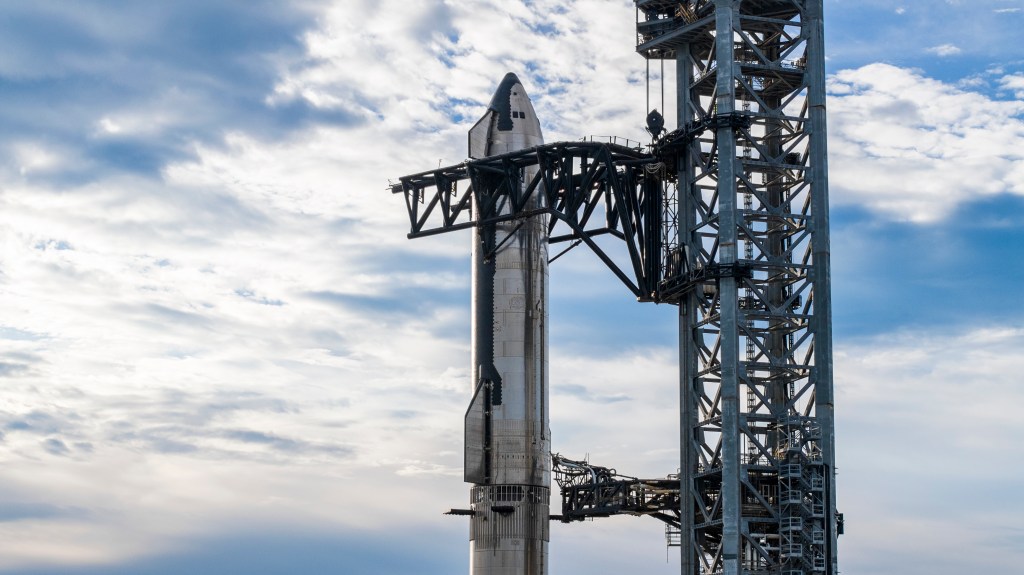The Federal Aviation Administration has concluded its review of SpaceX’s investigation of the second Starship launch in November, with the regulator saying Monday that it accepted the “root causes and 17 corrective actions” identified by the company.
While this means the investigation is now closed, SpaceX must implement all the corrective actions and apply for a modified launch license before it can fly Starship again.
“The FAA is evaluating SpaceX’s license modification request and expects SpaceX to submit additional required information before a final determination can be made,” the regulator said in a statement Monday.
SpaceX’s second orbital flight test of the nearly 400-foot-tall Starship rocket in November went farther than the first test by a huge margin: all 33 of the Raptor engines on the Super Heavy booster powered on successfully and none failed in the course of the nearly three-minute ascent burn. The company also pulled off a spectacularly difficult “hot-stage separation” for the first time, wherein the Starship upper stage lit up to push away from the booster.
But like the first test, which occurred last April, it ended in a fiery explosion mid-air. When any rocket launch encounters catastrophic issues during flight, the FAA opens what’s known as a “mishap investigation” — that’s what’s happened here. These are led by the company and reviewed by regulators, who must sign off on the analysis and ensure the corrective actions are actually implemented. After the first test, the FAA directed SpaceX to complete 63 corrective actions.
Per the FAA, the company ultimately identified seven changes to the booster and 10 to the Starship vehicle:
“Seven booster corrective actions were identified, including redesigns of vehicle hardware to increase tank filtration and reduce slosh, updated thrust vector control system modelling, reevaluation of engine analyses based on OFT-2 data, and updated engine control algorithms. Ten Starship corrective actions were identified, including hardware redesigns to increase robustness and reduce complexity, hardware changes to reduce leaks, operational changes eliminating pre-second engine cutoff propellant dumps, flammability analysis updates, installation of additional fire protection, creation of analytical guidance, performance of transient load analysis, and modeling updates.”
In an update also published Monday, SpaceX demystified some of these corrective actions in a rare post-launch postmortem, with the company noting that the likely root cause of the booster’s “rapid unscheduled disassembly” — aerospace lingo for “explosion” — was a filter blockage in one of the Raptor engines. This engine failed “energetically,” the company said, which led to a total loss of the booster.
The Starship upper stage met its own end around seven minutes into the flight, when a propellant leak started a fire that severed communication between the spacecraft’s onboard computers. This led to an engine shutdown, which then triggered the autonomous flight termination system to destroy the vehicle.
Some of these hardware changes and design upgrades have already been introduced to the versions of the vehicle that will fly for the third orbital flight test, SpaceX said in the update. Company CEO Elon Musk said during a conversation on his social media platform, X, that mission could take place as soon as the second week of March.
“More Starships are ready to fly, putting flight hardware in a flight environment to learn as quickly as possible. Recursive improvement is essential as we work to build a fully reusable launch system capable of carrying satellites, payloads, crew, and cargo to a variety of orbits and Earth, lunar, or Martian landing sites,” SpaceX said in the update.
Ultimately, SpaceX is aiming to complete the full mission profile, which includes the Super Heavy booster completing a “boost back burn” and executing a controlled splashdown in the Gulf of Mexico. Starship would then fly halfway around the world and land in the Pacific Ocean.































Comment